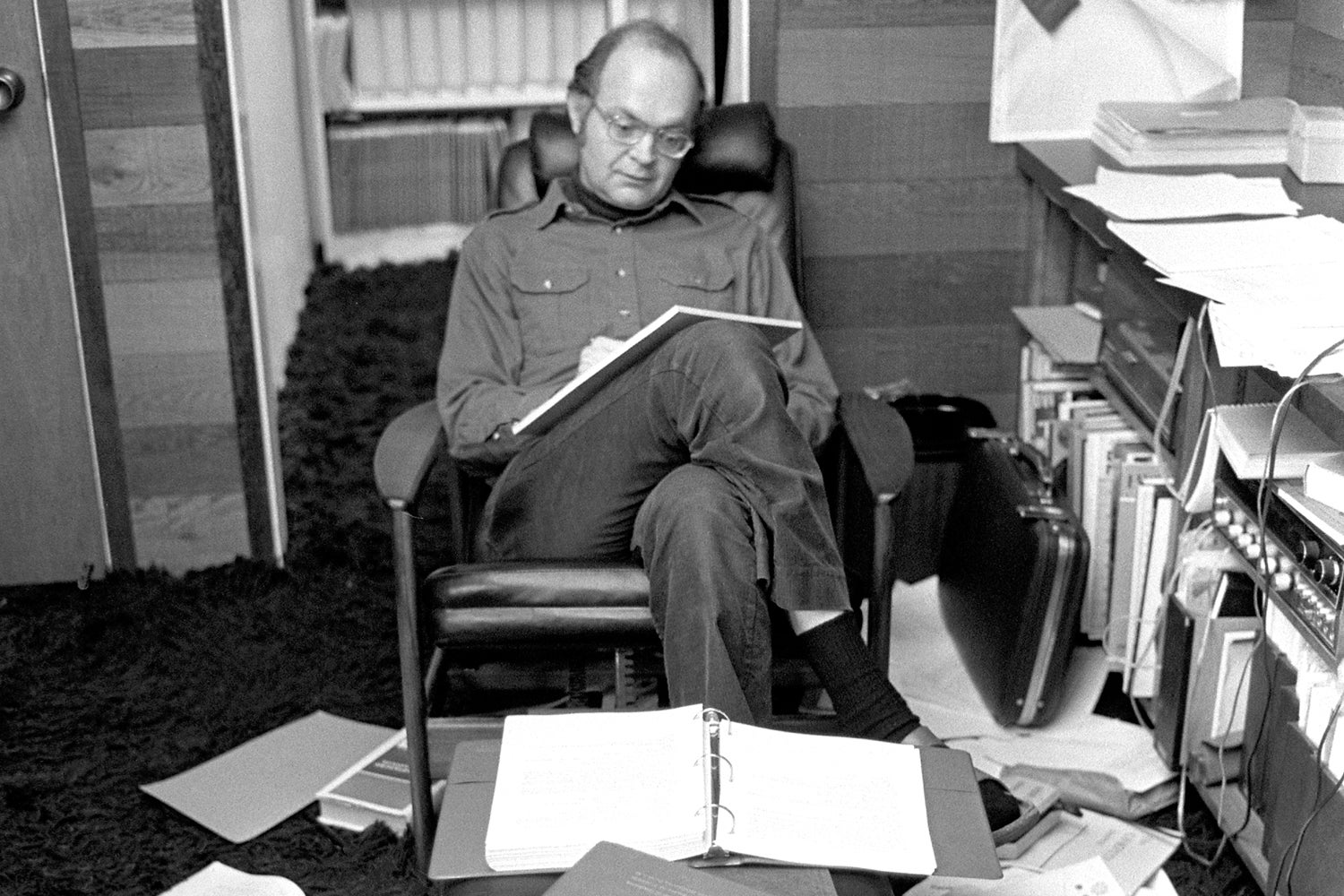Donald Knuth receives Kyoto Prize, the Japanese ‘Nobel’
Computer science professor is honored with Japan’s highest private award for lifetime achievement.
Donald E. Knuth, one of the acknowledged fathers of computer science, will receive the 1996 Kyoto Prize, Japan’s highest private award for lifetime achievement.

Donald Knuth, computer science professor, in his home office. (Image credit: Chuck Painter / Stanford News Service)
Kazuo Inamori, founder and president of the Inamori Foundation, announced the award Friday, June 28. Each year, the awards are given in three different categories: advanced technology, basic sciences and creative arts. Knuth, professor emeritus of computer science, was named the recipient in the advanced technology category. The prize includes a certificate, gold medal and prize money of approximately $460,000.
“This is just a dream and I’ll have to wake up to see who really won the prize,” Knuth said.
Colleagues from the computer science department held a surprise lunch in the Gates Building to celebrate the announcement.
“For those of you who don’t know what the Kyoto Prize is, it’s the Japanese version of the Nobel Prize. It’s also the closest thing we have to a Nobel Prize in computer science, on top of the Turing Award, which Don has already won,” said Dean of Engineering John Hennessy, who officiated at the informal ceremony. “I am reminded of that old saying, ‘It couldn’t have happened to a better person,'” Hennessy said.
Knuth is only the third computer scientist to win the prize since it first was awarded in 1985. Eight years ago, John McCarthy, professor of computer science at Stanford and the creator of symbolic processing, the language used in artificial intelligence research, received the award. In 1992, the award was given to Maurice Wilkes, a computer engineer at Cambridge University in England.
Knuth, who is most comfortable in a work shirt and blue jeans, is best known as a pioneering mathematician whose research has been of primary importance in the analysis of computer algorithms, procedures by which computations are carried out. He is also a leading investigator of programming languages and his work has been instrumental in establishing the field as a scholarly discipline.
Among his most widely acclaimed works is the series The Art of Computer Programming. When he started writing in 1962, he expected to finish by the time his first child was born. That son, John, is now a Stanford graduate, and the computer scientist has completed three volumes. Although his colleagues have characterized his work as “the bible and encyclopedia for computer science,” Knuth does not consider it finished. In fact, he took early retirement in 1993, when he was only 55, to devote full time to this task. He estimates that he will add about 250 pages per year, starting next year, for 15 to 20 years before he is finished.
Part of the reason the project has turned into a life’s work is the rate at which the field of computer science is developing, he said. “In the 1960s I could be exhaustive. Now I have to be content with boiling down the most important developments into the clearest, most concise language possible.”
But another reason is Knuth’s passion for perfection. When he got the galleys for the second volume of Programming from the printer, he was horrified at how ugly they looked. “My first edition had been typeset by hand and was very beautiful, but the second edition had been typeset by computers. Knowing a computer was the culprit made me even more upset,” he told an interviewer.
So Knuth applied his knowledge of mathematics and programming to the art of typeface design and typesetting. He developed a document preparation system called TeX and a font design system called METAFONT that first gave computers the ability to control text layouts typographically and print with typeset quality. These programs have been called the single most important achievement in publishing since the invention of the printing press. Rather than copyrighting and licensing these programs, Knuth put them in the public domain so they are freely available.
Since his retirement, Knuth has given seven to eight lectures annually under the title of “Computer Musings.” He said he intends to continue this practice as a way to contribute to the department.
He will use part of the Kyoto Prize money to share the honor with 10 close relatives by taking them with him to Japan in November for the award ceremony. He will invest another portion to making the “book writing factory” in his home more efficient. “I have some ideas for a custom-designed desk that should help,” he said. Finally, he will use some of the money to improve his wife’s art studio.
